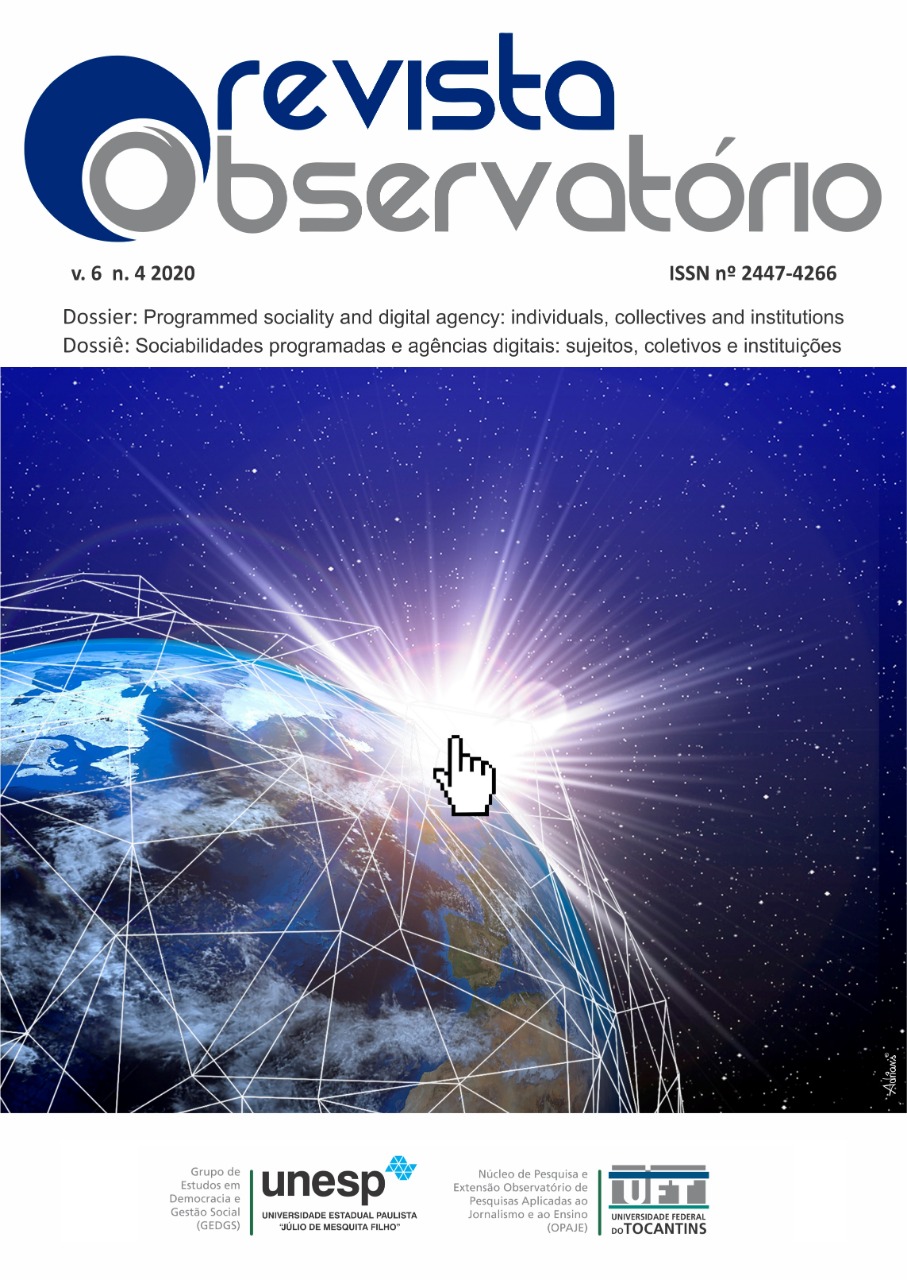INDIVIDUALS, COLLECTIVES AND SOCIABILITIES IN SOCIAL NETWORKS: promoting new forms of inclusion and active job search
DOI:
https://doi.org/10.20873/uft.2447-4266.2020v6n4a8ptKeywords:
Social Networks; Facebook; Sociability; Employability; ”REviver na Rede”.Abstract
The digital revolution has instigated the paradigm of the networked society, mediated by technology, with an impact on lifestyles, increasingly more virtual and, stimulating new forms of sociability between individuals and collectives. In this text, we present a reflection on the relationship between digital social networks, active job search and social inclusion. Moreover, we present the case of the Project “REviver na Rede”, which has been enabling us to conclude that social networks, like Facebook, are valid tools for the integration, socialization and active job search, helping to improve the employability and also the economic and social development of local communities.
Downloads
References
ALBERTO, Maria. A Noção de Empregabilidade: Origens e Usos. In Revista Trabalho & Educação, n. 14, 2005, Disponível em https://periodicos.ufmg.br/index.php/trabedu/article/view/8853. Acesso 9 mai. 2020.
ARCOVERDE, Ana. Emprego/Desemprego e Redes de Sociabilidade. In Anais do XXI Seminário Latino-americano de Escolas de Trabalho Social: Chile, 1998. Disponível em http://www.ts.ucr.ac.cr/binarios/congresos/reg/slets/slets-016-041.pdf. Acesso em 23 mai. 2020.
PINTO, João. Formação aberta e online, redes sociais e inclusão digital: o projeto Reviver na Rede. Lisboa: Universidade Aberta, 2017. Disponível em http://hdl.handle.net/10400.2/6930. Acesso em 11 mai. 2020.
BENTO, Afonso. Desemprego, Pobreza e Exclusão Social. Universidade de Coimbra. 2011.
BOTO, Bárbara. Relação entre Adaptabilidade e Empregabilidade. Lisboa: Universidade de Lisboa, Faculdade de Psicologia. 2011. Disponível em http://repositorio.ul.pt/handle/10451/4963. Acesso 5 mai. 2020.
BRAUDEL, Fernand. Civilisation matérielle et capitalisme. XV-XVII siècle. Paris: Armand Colin, 1967.
CARDOSO, Luis; VARANDA, Pedro; MADRUGA, Paulo; ESCÁRIA, Vitor; FERREIRA, Vitor. Empregabilidade e Ensino Superior em Portugal. Lisboa: ICS / CIRIUS / ISEG, 2012.
CASTELLS, Manuel. A Sociedade em Rede. A Era da Informação: Economia, Sociedade e Cultura. Lisboa: Fundação Calouste Gulbenkian, 2011.
COUTINHO, Virginia. The social book - tudo o que precisa de saber sobre o Facebook. Coimbra: Conjuntura Atual, 2014.
DIAS, Patricia. Viver na Sociedade Digital - Tecnologias digitais, novas práticas e mudanças sociais. Lisboa: Principia, 2014.
DUARTE, Ana. Vivências de desemprego e transformação dos modos de vida dos operários mineiros. Sociologia, n. 8. Porto: Universidade do Porto, 1998. Disponível em http://ojs.letras.up.pt/index.php/Sociologia/article/view/2574. Acesso em 1 jun. 2020.
FURTADO, José. Fractura digital e literacia: reequacionar as questões do acesso. Comunicação & Cultura, 2007. Disponível em http://hdl.handle.net/10400.14/10381. Acesso em 30 mai. 2020.
GISPERT, Carlos. Enciclopédia de Psicologia. Lisboa: Oceano – Liarte, 1999
HOFFMAN, Reid; CASNOCHA, Ben. Vencer nas Redes Sociais - Start Up, Um Novo Futuro. Lisboa: Clube do Autor, 2014.
KELLY GLOBAL WORKFORCE ÍNDEX. Lisboa: Kelly Services. 2011
KIRKPATRICK, David. O Efeito Facebook - A história da empresa que está a mudar o mundo. Lisboa: Arcádia, 2011.
LATOUR, Bruno. Reagregando o Social: uma introdução à Teoria do Ator-Rede. Salvador/Bauru: EDUFBA, 2012.
LÉVY, P. A inteligência coletiva: por uma antropologia do ciberespaço. 4.
ed. São Paulo: Loyola, 2003.
LOISON, Laurence. Mecanismos compensatórios do desemprego em Portugal: família e redes. In Atas do IV Congresso Português de Sociologia. Lisboa: SPS, 2000. Disponível em https://aps.pt/wp-content/uploads/2017/08/DPR462dd09ab4baf_1.pdf. Acesso em 3 jun. 2020.
LOPES, Miguel; CUNHA, Migeul. O Mundo é Pequeno - O que podemos aprender sobre Networking e as Redes Sociais. Lisboa: Actual Editora, 2011.
MARQUES, Ana Paula. Trajectórias Quebradas - A Vivência do Desemprego de Longa Duração. Lisboa: Profedições. 2009.
MILGRAM, Stanley. The Small World Problem. Psychology Today. 1967. Disponível em http://snap.stanford.edu/class/cs224w-readings/milgram67smallworld.pdf. Acesso em 15 mai. 2020.
OLIVEIRA, Jayr. Tecnologia, Trabalho e Desemprego: um desafio a empregabilidade. In II Simpósio de Excelência em Gestão e Tecnologia- SEGeT. 2005. Disponível em http://www.aedb.br/seget/arquivos/artigos05/377_ARTIGO%20ENVIADO%20PARA%20O%20CONGRESSO%20DE%20RESENDE-RJ.pdf. Acesso em 11 mai.2020
RECUERO, Raquel. Redes Sociais na Internet. Porto Alegre, Brasil: Sulina, 2009
RHEINGOLD, Howard. Net Smart - How to Thrive Online. Cambridge, Massachusetts, EUA: MIT Press, 2012.
SANTAROSA, Lucila; DEBORA, Conforto; SCHNEIDER, Fernanda. Tecnologias na Web 2.0: o empoderamento na educação aberta. In Colóquio Luso-Brasileiro de Educação a Distância e Elearning. Lisboa: Universidade Aberta, 2014. Disponível em http://repositorioaberto.uab.pt/handle/10400.2/3071. Acesso em 6 jun. 2020.
SANTOS, Ana. Desemprego e trajectos de exclusão social. Universidade Nova de Lisboa, 2010.
SANTOS, Francisco; PETERSEN, Cristina. Redes sociais, redes de sociabilidade. Revista Brasileira de Ciências Sociais, vol. 29 n. 85. São Paul: ANPOCS, 2014. Disponível em http://dx.doi.org/10.1590/S0102-69092014000200005. Acesso em 21 mai. 2020.
TAVARES, Sandro Rafael. Plataforma para Gestão de Conteúdos de Entretenimento. Porto: Universidade do Porto, 2013, Disponível em https://web.fe.up.pt/~tavares/downloads/publications/teses/MSc_Sandro_Tavares.pdf. Acesso em 19 mai. 2020
TURKLE, Sherry. A vida no ecrã. Lisboa: Relógio d’Água, 1997.
VERMELHO, Sónia; VELHO, Ana; BONKOVOSKI, Amanda; PIROLA, Alisson. Refletindo sobre as redes sociais digitais. Revista Educação & Sociedade, 35, 2014. Disponível em http://dx.doi.org/10.1590/S0101-73302014000100011 Acesso em 1 jun. 2020.
Published
How to Cite
Issue
Section
License
[PT] Autores que publicam nesta revista concordam com os seguintes termos:
1. Autores mantém os direitos autorais e concedem à revista, sem pagamento, o direito de primeira publicação, com o trabalho simultaneamente licenciado sob a Creative Commons Attribution License (CC BY-NC 4.0), permitindo o compartilhamento do trabalho com reconhecimento da autoria do trabalho e publicação inicial nesta revista.
Leia todos os termos dos direitos autorais aqui.

